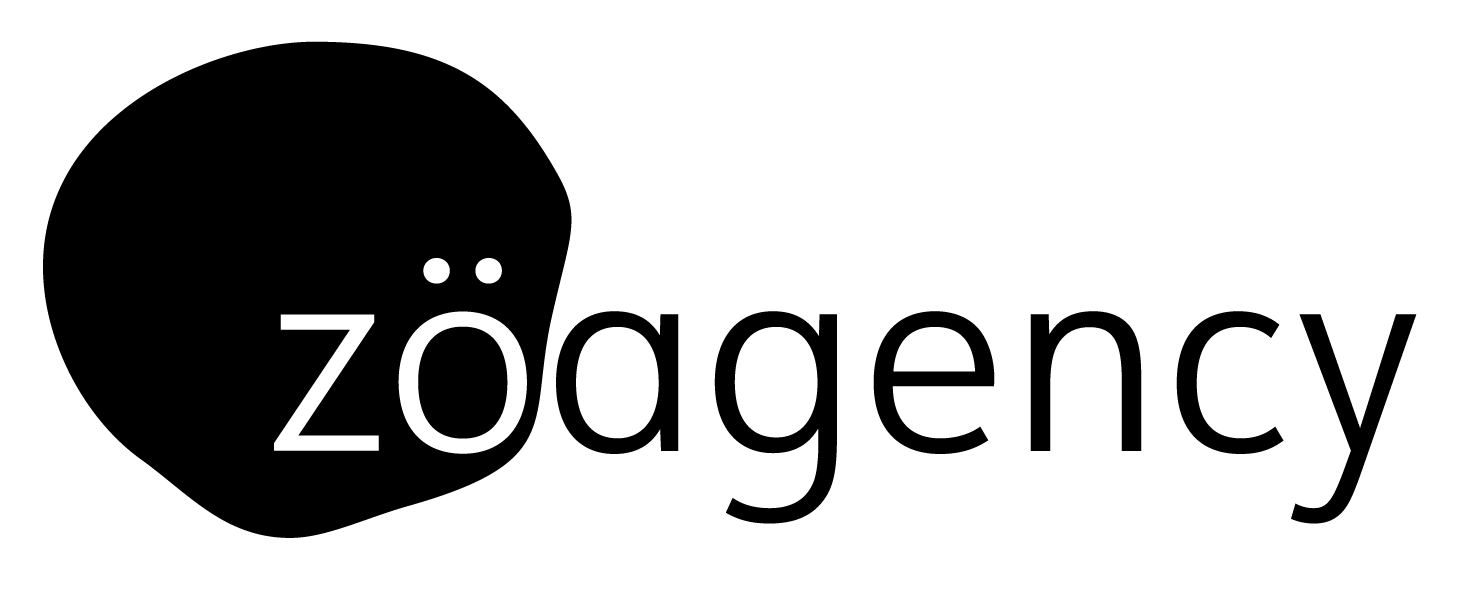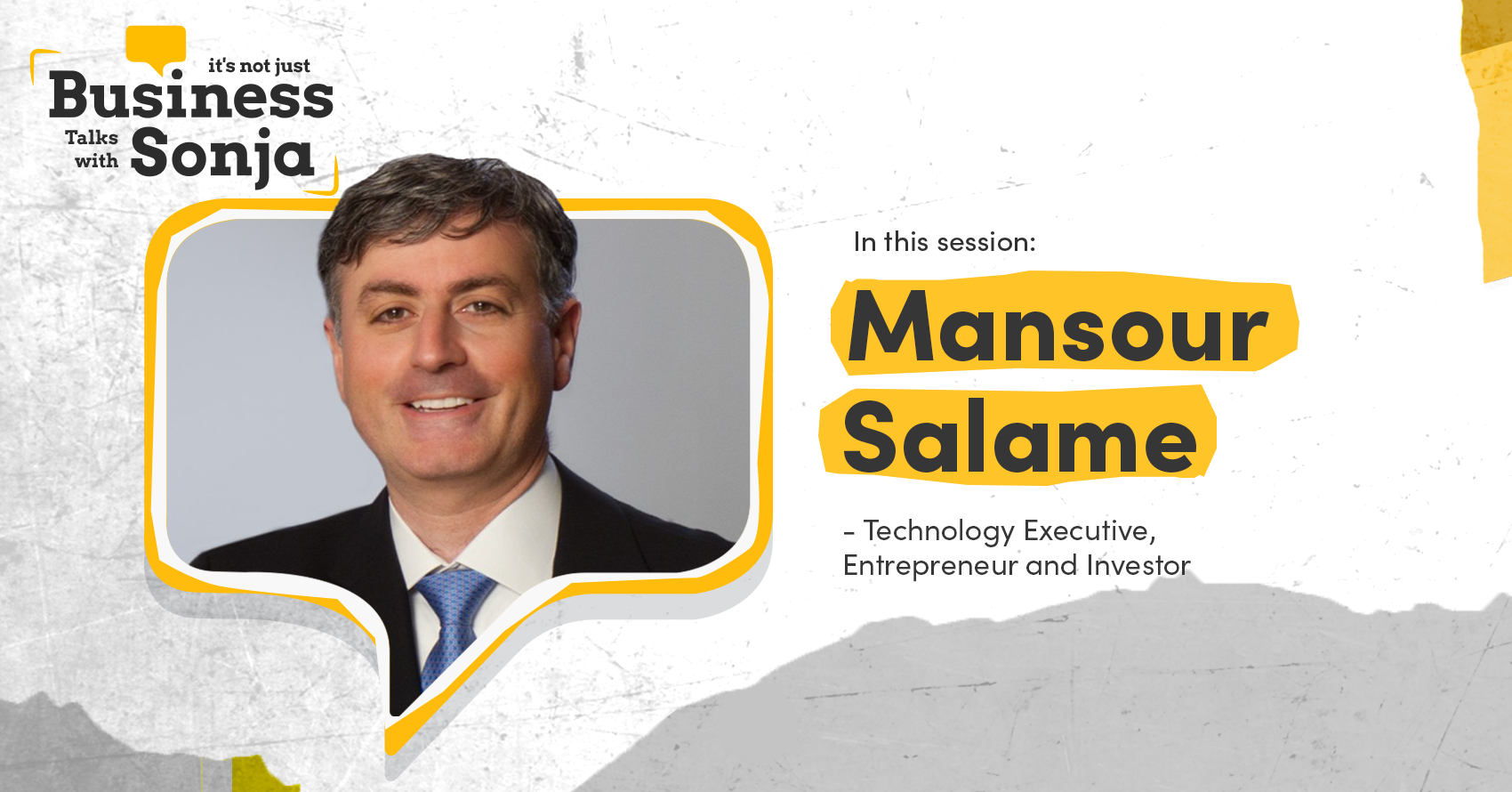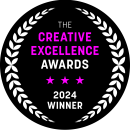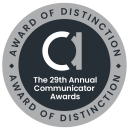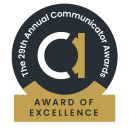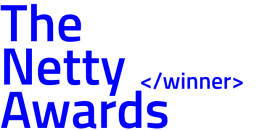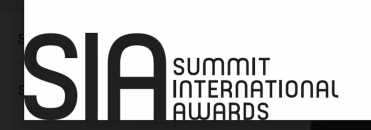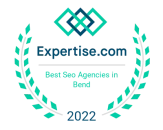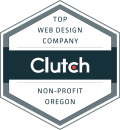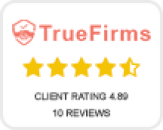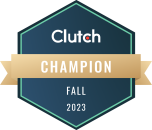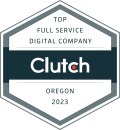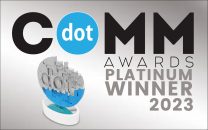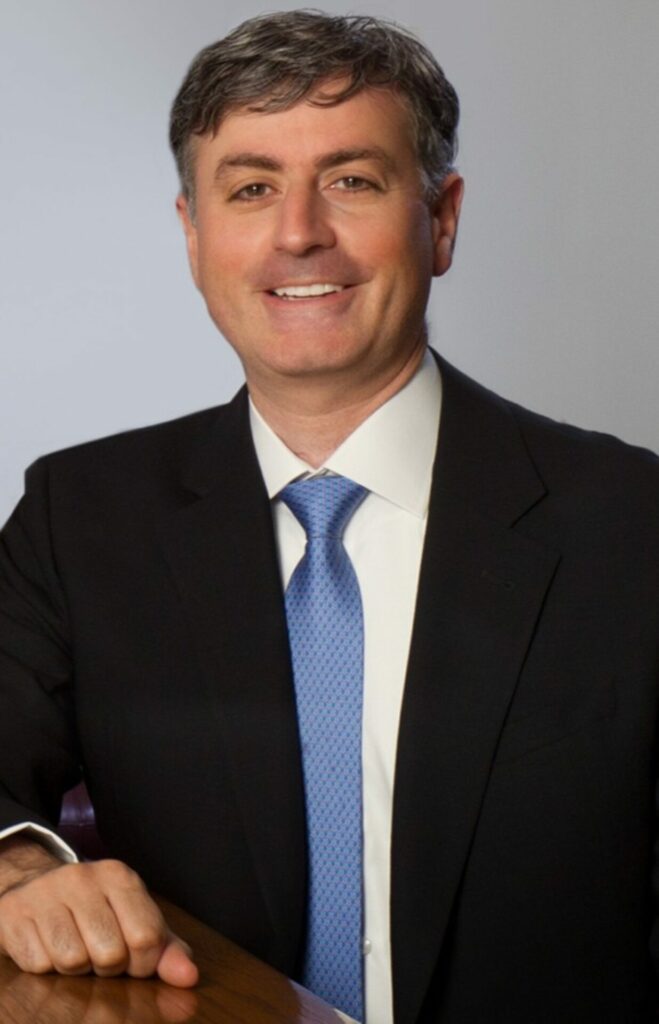
Mansour Salame Is a successful technology executive, entrepreneur and investor. His first startup NextAge Technologies was acquired by Alcatel (NYSE: ALU). His second startup Contactual, was acquired by 8×8 (Nasdaq: EGHT). He has recently Started his 3rd Startup, FrontSpin : A Sales Communications Platform. He is an investor in a number of Technology Startups and he President of Petree Properties a real estate investment firm. He also served on the Board of Directors of 8×8. Prior to NextAge he was an executive at Genesys Telecommunications Laboratories, Inc. and a management consultant at Andersen Consulting (Accenture). Mr. Salame has a Masters of Science degree in electrical engineering from Stanford University and a Bachelor of Science degree in electrical engineering from Northwestern University.
Transcript:
[Music] Welcome to ‘it’s not just Business Talks with Sonja’ where we get down to the real business of how great leaders dug through their own trenches and climbed some epic mountains to get where they are today now let’s get started with the show [Music]
Hello everybody I am here with Mansour Salame and he is a successful technology executive entrepreneur and investor his first startup of many was Next Age Technology and that was acquired his second startup Contactual was also Acquired and he has recently started his third startup front Spin and what do I think he’ll probably be acquired um Salame it’s a sales communications platform. So he’s an investor in a number of Technology startups and the president of Petrie Properties which is a real estate investment firm he’s also served on the board of directors of eight by eight and prior to next age he was an executive at Genesis Telecommunications Laboratories Inc. and a Management Consultant at Anderson Consulting Mr. Salame has a Masters of Science degree in electrical engineering from Stanford University no less and a Bachelor of Science degree in electrical engineering from Northwest university did I capture all that right Mansour?
Yes.
And you know I think you can just retire now-
Hi Sonja!
Hi! you’re you’re uh your your resume is quite lengthy um but it begs the question my first question of course is how did you get started in all of this because obviously you went to your you’re you’re an entrepreneur but you’re Highly Educated which came first so where did you get off on the entrepreneurial track from from your education track?
So obviously uh uh uh coming out of school I needed to get a job and I got a job at what uh used to be called Anderson Consulting they’re called Accenture now.
Accenture, yeah.
And it was a great experience for me because I was able to consult on a number of different technology topics for a number of different firms. One of the first projects I was on I they flew me down to- they put me on a project out of Mexico City-
Ooh!
-So I was Consulting for one of the large Banks there on communication Technologies. And then uh one of the uh follow-up projects I was staffed out in Canada Consulting for one of the television firms there so I was able to see a number of different problems in a very short amount of time.
Mmm, Mhm.
And one of the things that was hitting me is there was a need that was in the early to mid 90s and there was a need for a lot of different Technologies out there that didn’t exist at the time that I believed if these Technologies existed could solve a problem much easier. So one of the things I’ve always had ideas and I couldn’t see them happening so I thought you know what if no one’s doing it I better go ahead and do it and uh you know I actually ended up joining a small firm at the time called Genesis television Labs uh after Accenture.
Genesis, yep.
um and the way it happened was um I had graduated from Stanford worked for a few years for Accenture and I wanted to go back to school and I applied to business school to Harvard and Wharton and got in and uh and then what happened is I was about to resign and I get a call from the CEO of Genesis labs. Um which I was implementing their technology at one of my clients at Accenture and he tells me ‘Hey listen what’s going on I hear you’re quitting Accenture.’ I’m like yeah I’m taking like six months off before I go to Business School and he’s like ‘why don’t you come and help us?’ um so they we’re in California, so I said fine you know I’ll I don’t have much to do for six months till school starts I’ll come and help you guys.
So then I went ahead and I started helping them and I was helping them Implement their technology at Wells Fargo which was a bank.
Yep.
And uh the thing was the project was going really badly, but I managed to turn it around and Wells Fargo decided to standardize on the technology on the Genesis technology lab so they came back and they gave us a bigger order and um what happened after that there was a prospect a French a French company called France Telecom, it was a teleco in France, they came over to California to visit Genesis and the CEO of the time his name was Greg asked me ‘hey don’t you speak French?’ and yeah I speak French! I went and met them and convinced them to place the order with Genesis – French to French I guess if you will – and then he’s like you know we really need somebody over in France to implement this thing do you want to go start the French office and it was about the same time that uh business school was about to start and so I got a one-year deferral and then I started Genesis France when became uh Genesis Europe eventually.
Uh I was running that out of Paris and a year later when business school came uh to be I said look I’m not going to go back sorry I’m not going to put my deposit down and I kept enjoying running the the firm and we ended up going public in 96.
Wow.
So that gave me uh from Accenture uh the entrepreneurial uh perspective of starting a company and um it was it was a lot of fun it was a lot of ups and downs before it went public and I always uh- but I enjoyed it I mean I enjoyed the creativity that you had to have the problem solving and the grit you always had to have and running so uh it’s kind of became innate in me since since those days.
Do you think that that’s almost no no no um harm no foul to Harvard by any stretch of the imagination what a great school but do you think you almost learned through the street smarts the actual entrepreneurial boots-on-the-ground experience um the same, or similar, talent that you would have experienced by going to college at that time?
You know I learned a lot of different things because when I joined Genesis uh within the first month they missed payroll.
Oh gosh.
Okay so then I would call my parents and I say hey you know I I they’d ask me how’s it going well it’s pretty good they missed payroll you don’t care you’re going to Harvard in the fall right I mean that was kind of thing and then they missed payroll a couple of times. Once, I showed up at the office the landlord took the doorknob away because I hadn’t paid stuff right so but this is like kind of the reality of a bootstrap startup.
Yes! yup.
And we were able to turn it around and able to adapt the product exactly to what was needed in um uh in the marketplace and take off to be able to go public two years later.
Wow.
This is something that maybe you can read case studies at Stanford or Harvard or Warden or you know any of these Business Schools but you would never be able to get that Corporal experience of student you know payroll didn’t happen everything else and-
Yeah.
-um people would have shut down the firm many times I mean if you go back and look at it- say okay, you you can’t do these things. But it was kind of that kind of stuff that happened and so they had missed payroll and then I was the product manager at Wells Fargo we managed to get a big order that helped them make payroll the next time and cast out payroll and then when I closed my telecom that also helped so uh it was a very different um perspective of building it, then I think if you read the case studies.
Uh I don’t think you could have got that experience and for me I’m like you know what I’m going to run chances uh France and southern Europe for a couple of more uh quarters and I’ll get better experience in going back to Harvard and I feel um…
And you know I mean maybe less at Stanford but all these East Coast Schools that have this elitist approach of ‘we know better’ and I think that’s kind of the…
It’s dangerous and entrepreneurialism to think we know better. You’ve always got to get the signals from the marketplace and this is something that I learned you always got to iterate make things better and if you start ignoring these signals and start looking down ‘oh you know I’m smart I know better’ and I mean that’s why that um a lot of the entrepreneurs uh come out of you know Stanford like uh something and some even don’t even have a college degree.
Right.
Uh so because I mean the textbooks are interesting they they give you a framework to learn but that gave me to take a look at Steve Jobs, Bill Gates, Larry Ellison.
Absolutely!
Um uh you know kind of uh kind of drop out and I mean even if you take a look at Zuckerberg he started it before he graduated from Harvard. Um so you know would that have been useful? Yeah, you would have gotten a great Network, great credentials-
Yes. Yep!
Uh and I’m sure to impressed with certain people uh you know having gotten a degree a graduate degree from a grade school I didn’t feel I needed that validation.
Sure.
Uh I I felt I needed to roll up my sleeves and do the work and that was the fun part and that’s how I was growing faster.
Yeah. I mean it’s they have the old uh the old adage or the School of Hard Knocks and I mean it doesn’t mean that you have had to have a horrible time it really just speaks to learning through experience versus learning through the educational Channel but both are I find them both I went back to school even though I’m technically a CMO/creative director, simply because I wanted to actually see what the school was was delivering and they do they absolutely your the education system has to deliver things to put people out into the field armed with lots of knowledge but there’s a tremendous amount of value in that street and you’re not that you’re on the streets by any stretch of the imagination in Paris Canada and Mexico City but uh there’s something about rolling up your sleeves and actually doing the work makes you a a fully engaged uh person entrepreneur and you went to do it more than once so you went on to do that again.
Uh so what were you creating the next time to solve for?
So then I um I mean what happened when I created my first so I was at Genesis, we had gone public.
Genesis.
And then I started Next Age but the way I started Next Age is I found one of my larger customers in France was uh we Telecom they were the third Teleco in France and they had a problem um in their call center department where they needed to schedule uh call center agents according to the call volume at the time, the email volume – but without violating Union rules and making sure they followed all these rules so they didn’t get penalized – but they never wanted to be overstaffed because if they over staff they were paying too much never wanted to be understaffed…
And they had a R&D division it was a pretty big company not unlike Bell Labs but it was like the French version of Bell Labs where they had developed this great tool.
And I try to tell Genesis we got to do a deal with those guys we got to take this tool and sell to all the other customers because we were selling into the call center and Genesis said ‘oh no no we’re so busy doing this thing’ and I’m like okay if you guys aren’t going to do it I’m going to do it so I but-
I’ll replace my- I’ll hire my replacement and I’m going to go build this product-
Brilliant.
-and then I did a deal with uh that customer of Genesis – who was my customer at the time – to be able to take their technology to get started on a product we built the product we started selling to all the customers that we knew and that’s the second one because like I saw an opportunity it solved a great problem and it’s always I mean things that you have a hard time in school is you don’t take enough you don’t talk enough to customers understand their problems and solve it you can try and assume what the problems are but it’s never the same of having that iteration ‘I’m having a problem I’m spending too much money here too much time there’ or ‘I’m not getting enough reach here’ and okay what and when you try to understand like how how can you solve it and um so I really enjoy that part of providing a technology that didn’t exist before to certain customers or to the market and solving a problem. That- I mean you know, and you know the way I Justified it to my parents and and to my friends like you know what we’re going to go public we’re going to make money and we made a lot of us made a ton of money at Genesis when it went public, but it was never the motivation.
The motivation was always uh finding a problem and solving it and delivering value that way more than people paid you you delivered a normal value and for me the exciting thing is when you have this first version of the technology or the product and it’s the first time the customer uses it in production and you’re kind of on edge are they going to get value yes or no and boof they get value and then it goes from there and that’s like a thrilling thing beyond any financial reward you can get or anything you justify and where a team has been working with something and there’s this validation of we’ve added value all the work we did has been validated because the customer enjoys the product and gets value out of the product.
And you can try and justify your friends oh yeah we went public we made money- but I don’t know any entrepreneur that started a company to get rich or any of the uh the great ones I mean I think even if you take a look at Bill Gates I don’t think he did it for you know he was one of the wealthiest guy I don’t think Larry Ellison did it I’d be surprised if Elon Musk did it does it for the money. Uh he does it for the for the love of the game and I mean he wants to put people on Mars do you think he cares if he’s the richest man in the world?
He sleeps in his office half the time so he clearly doesn’t care about the luxuries of life that much either.
The minute he puts a human on Mars that will be worth to him more than a hundred times any any wealth he has on Earth.
Yep. Absolutely, absolutely.
I mean he would have made us an interplanetary species I mean that would have been I mean that’s his life work right? so um anyway…
And I do agree with you Mansour, because I think that um a lot of people ask me you know why do you do what you do because uh as any entrepreneur, every organization uh many of the clients that we work but but ourselves too I mean we’re tenured you go through really dark rock bottoms during the journey of growing a company and you have to learn a lot in real time um and make decisions uh in real time that if it was for the money uh I would uh certainly just go get a high paying executive job at some Fortune 100 company and take care of that you know but it’s not about the money it’s for the for the love of the game the love of the results for sure.
Yeah. So how many times did uh Elon Musk almost go bankrupt?
Oh my gosh I can’t even keep track!
I mean how many times has he been sleeping in the like you said on the factory floor because we they needed to solve a business problem and the only way to do it is yeah you know the rubber meets no pun intended with Tesla but you know when the rubber meets the road you know. So yeah I mean those are the the great entrepreneur I’m I’m sure there’s different different people that get value out of different things and people like you said get Harvard degrees and become either Venture capitalists or or Bankers or Management Consultants like my like when I started my uh career um and uh there’s nothing wrong with that I mean there’s a need for everything and uh it depends what uh what turns you on what gets you out of bed and makes you do the best work possible.
Yeah, it is that inner spark for sure because then you went on to do startup Contactual and then uh Frontspin, Frontspin is is your current one of your current one of your current menu-
Right, yeah.
And um how long have you been working on that?
So Frontspin we’ve had it for a few years uh Contactual we sold, uh Contactual was acquired uh so Contactual we started the Genesis the Contactual- no pun intended we started that in uh 2000 just at the turn of the century and we’re talking about cloud and cloud-computing back then before it was uh hip with whatever happened-
Yep, yeah, everything.
And again it’s great to see the the division happened and we got acquired by 8×8 I think in 2011. And I stayed on the board for a few years and again similarly I thought there was an opportunity that 8×8 could build the sales communication platform that Frontspin did, but they didn’t want to do it and again says you know an entrepreneur when we see an opportunity that-
Yeah
-I don’t necessarily want to do it but I think it’s rude that nobody does it.
Right! Yeah.
So if nobody’s going to do it I’ve got to do it. It’s almost like you know you see a stain you gotta if somebody’s got to clean it if not you got to clean it up you know you know so it’s kind of that kind of stuff uh you see an opportunity you see you can add value why is nobody doing it?
Uh so you feel like you have a duty, almost? It’s a duty that- okay we gotta we gotta we gotta do it because we see it and I could be wrong but if I’m right it’s really a duty to bring this to the market, Right? Because-
I mean the thing is, you you could though you could get yourself spun out with two because you you’re you’re someone that’s constantly creating uh you know ideas and seeing problems to solve do you ever find yourself going okay I have to stop I should tell somebody else to do that or tell this person to do that because I need to streamline my attention on just this one thing or do you pick them all up do you pick up every rock?
I don’t pick every Rock, unfortunately, I have a lot of ideas I mean I I like to make a certain level of difference and one thing that you realize: there are two distinct levels in my opinion of companies from my experience I mean it could be different in different ways and you know at the first it’s when you are in what I call the search mode you’re searching you know a customer’s got a problem you’re searching for the solution how do we build this technology you have some ideas.
Okay, you build the technology, okay, then you’re saying how much can we charge? how much would a customer pay for it? can we deliver it at a cheaper value and make our margin? So then you’re working a little bit on the business model, how do we go to market? how do we market it? how different bit ourselves…
So that’s kind of the third mode right, and then what you see is then there’s a scaling mode. Okay, so now we figured out the formula how do we make a hundred of them? And it’s almost like thinking and creating and the scale mode is bad like you know this is It’s almost like they can have it as long as they can have any color as long as black but what Henry Ford used to say. Whereas I enjoy the thrift mode a lot-
Yeah.
-and creating different things and I’ve surrounded myself with other people and I’m delegating a lot of the scaling a lot of the go-to-market uh um to to other people so it allows me to create something that doesn’t exist but to scale is not is not what I’m great at so we’ve tried to partner also with larger companies to go to to market and this is what a lot of people don’t quite understand like a small startup is not a small version of a big company, right?
Correct.
And a big company is not a big version of a startup the way it’s organized the way it functions is a totally different animal.
Mhm.
It’s not like this is an orange and this is a bigger orange. So there are totally different animals and bigger companies are very good at scaling and very good at reach but they’re not good at Innovation. They’re not good at creating a new product.
Um you know when Alcatel bought um my my uh Next Age indirectly Next Age my startup, we went from a three-month product cycle to an 18-month product cycle.
Interesting.
So what does that tell you is in 18 months I could have had many versions of the product when I was a standalone when I was part of Alcatel I’d be on version one was a startup I’d be on version four or five so the level of innovation is uh…
It slows down significantly.
It slows down significantly. On the other hand, and the the problem is if a big company takes something that’s wrong and scales it they’ve just made something bad bigger right and because they can’t iterate they can’t fix it fast enough it takes some 18-months to fix it? It’s too late. Whereas a small company we put something out something’s wrong when three months we fixed it in two to three months we fixed the next version you fix the next version but you get that feedback quickly but where smaller companies aren’t as good at scaling so uh there so you guys decide once you’ve solve the problem and there’s some there’s always some evolution but when there isn’t that much change in the product scaling is the most interesting thing for me for a bigger company for that product.
But I really enjoy the iteration part, to iterate to find the right product and iterate faster than anybody else you’re the first one to find that solution-
First to market, yeah.
-That really adds the the value.
So what is the trick then? So if you have that product and you’re able to be nimble and agile and I completely relate to that um as we grew everything slows a little bit just uh but it comes with more eyes on the product more uh input more talent around it but what is it that can take a a smaller organization, product, concept and scale it then? I mean-
So, I so, I think at the beginning you got to find the right product and then you’ll see once you get the right product the market pulls it in starts doing these things and then you got to start telling everybody but I think what happens is… in startups you have to be overqualified, okay?
So for instance, I’m the CEO but I’m also if there’s a tech support problem from a customer I will solve it with them I’ll work with them and solve it with them if there’s a finance problem I’ll help the finance people do it, right?
In a big company, God forbid that the should the VP sales try to do something with engineering.
Right?
You just do the sale.
You’re in your lane.
Just do the marketing.
Yeah.
You just do the thing. Whereas in a startup you have to be overqualified right and you and it’s that breadth that allows you to innovate and understand the whole journey the customer goes through. Versus being Elaine like the engineers they don’t understand like marketing gave them the requirements in big companies and they got to build this thing if they build it wrong marketing gets mad at them but it’s not like they had this direct link to the customers usually the engineers, right? And finance, God forbid, finance doesn’t even know what the customer is using it they just know if the customer pay the bill where’s your Finance understands oh yeah you know the customer had this issue can we solve for them and it’s a much more cross functional team that work together broadly and this is where innovation ends up happening and this is what I mean like a startup is not a small version of a big company whereas over there you got to be specialized, you know? You got to be the best salesperson
How do we scale it? We scale it this way, we don’t deviate, we just do this thing and then they do their job they we do our job.
Whereas, here you’re doing everybody’s doing everything.
Yes, absolutely. Been in the weeds-
And you’re probably you’ve probably been there-
Totally! Absolutely. um and so when you decide when you have a product um product or service that you’re about to scale you said you bring really specialized people around you delegate you you bring other people who are just like we know how to take this and instead of making the orange bigger make it a new version where we have Lanes, is that right? that people can-
Right, exactly. More specialized and get a GM in and do this stuff, yeah.
Because that’s a real talent, I mean I think-
It’s a different skill.
Yeah uh I’m in an agency Mastermind and one of the biggest topics that always comes up is there’s just that pain point at a certain point for a lot of agencies where they have done really well when they all know everything but when they scale uh certain lanes don’t line up or like you said marketing talks to engineering and they don’t speak the same language and um you’ve overcome that ,clearly because it keeps-
Oh you have to do processes. So it becomes a very processed oriented to scale.
Yeah.
-And everybody’s got to follow the process you can Implement improve the process to scale better but it’s a very process-oriented becomes documentation at the beginning you’re creating- you don’t know what the process is going to be but you you search it you find the right process even though three of four people and then you optimize it moving forwards and then then you scale. Obviously I’m not paying there is an iteration and things improvements it’s just the improvements in innovation takes a second seat to scaling.
Yeah.
And it’s the opposite at the earlier stage.
Yeah, it’s and so you like being at the earlier stage?
I enjoy the creativity of creating something out of nothing and being the first to create it and I partner with other people and also we do distribution deals where we have companies reselling us and partnering with us that are better at scaling they would have never been able to build our product and we’re happy to share our margin with them, right? And support them and even use their brand and everything else um and uh they’re really good at that we we love supporting these things but I think we lose our edge because we’re not venture back we’re profitable and we’re growing we lose our edge if we lose our innovation.
For us, as a smaller organization, um and-
You’re speaking of Frontspin now?
I was thinking of response by now.
I mean the thing is is that what you’re saying though also you started out with this conversation is we’re very curious people. Entrepreneurs are are just naturally curious uh self-educating constantly, whether it’s through connections and not always going back to school but just really just digging in and learning all the time.
Mhm, yeah and you do want to hear about things and I mean there’s a great example I had hired um you know, when I was running one of my previous companies we had Venture Capital and I had hired a great Vice President of Sales uh from a company called Oracle which was one of the large companies.
Yeah.
And-
Familiar.
At the beginning, just to give you an example, like you know we we did a deck and we started we had a day where we visited four customers, okay? So we went and pitched the first customer and he says ‘you know’ and I was with him his name was Darren uh me and Darren were the first customer were pitching them and that was um Contactual. And the guy uh was telling us ‘you know what I like this but I don’t like this, could you change this?’ and so on, and then we’re on our way to the next customer and I’m and then he’s ‘like oh what are you doing?’ oh I’m I’m changing the PowerPoint slide from what we heard the first customer so we had a different PowerPoint slide between the first thing he thought it was the end of the world ‘oh no we can’t change it’ it’s like, why not change it we just learned something from the first meeting to the second meeting where it said Oracle you couldn’t change slides you have to pitch the slide and this is it. You can get it as long as you follow these kind of things but that kind of gives you an idea that um there’s a time where these larger companies have a harder time innovating because you’re in the scaling mode and you take what you have you scale it and you’re no longer innovating so yeah I ideally I’d love to be able to do both and they’re kind of separate teams it’s hard I mean I think even now Apple, I mean one of the companies I always looked up to, especially under Steve Jobs they were able to do both: innovate and scale.
I don’t know if they’re still doing it I mean there isn’t any I mean they came up with the glasses but that’s not I mean yeah I mean that’s cute but it took them a long time to do that.
Uh, but and I do think another one that he’s able to do a great job innovating is Elon Musk.
Yeah.
And so there’s certain people that do both. Uh so, even in spite of their size they still have this Innovation and usually what that means if you take a look at the unique thing that those guys have is Elon is very much involved in engineering and product and Steve Jobs was also, right? He used to work with Ives on the design and I was lucky enough Bill Fernandez worked with us uh he was a number three guide apple he did the Mac OS UI and you tell us some of the stories and um so it is possible I think to do it it’s very hard it takes a very unique person to be able to scale and keep the innovation.
They have to be really involved, continuously.
Exactly.
Really boots on, I mean literally sleeping on the floor. They are they have to live and breathe it it’s not a-
Yeah, live and breathe it, and you have to fight the scaling and you have to fight the inertia against GM who wants you dead, against Ford that wants you dead, doesn’t want the innovation- you know they’d be happy selling you know gas guzzling pickup trucks, right?
Yeah.
And you have to- I mean an incredible weight on this guy’s shoulders- is unbelievable but that’s the kind of thing you need to do and I mean you can imagine also when Apple uh you know, came up with I’m iTunes against the music industry and then I mean you can imagine what they didn’t want that to happen and you can imagine what they came up with with the phone all the Telecom industry the Nokia’s the Siemens Erickson even the AT&T did not like the iPhones because they wanted to have more control over it whereas it gave control to Apple but it was the right thing for Humanity.
Mhm.
Um as opposed to the establishment, right? So uh uh you have to break the establishment and fight it and um you know.
Do you feel like that’s your and that’s is that part of your Credo then for you yourself as a as an ongoing entrepreneur and you’re now you know working as the president of Petri properties, right? So you’re you’re in real estate I mean are you still do is that your Credo is to fight the inertia of you you know the machine and the establishment to…
I do think it is even with Petri- and Petri I’m more hands-off uh I’ve got um I’ve got a person running development I got another person running property management and I got my CFO and I just do staff meetings but the staff meetings are much more like board meetings but the one thing about Petri, I mean as you know we’re in developing multi-family and I always tell them what we have to do is we have to come up with a better product and the better product we want to come up with a better apartment more affordable than the competition than the neighborhood and and provide better amenities and I kind of challenge them and they always say oh we can’t do it and then keep challenging to them and then they come up with some interesting things.
So um it’s always being able to to push this thing and I do think it ends up like you know here we’re doing stuff in San Diego and in Phoenix and I do think it helps the city.
So again you’re doing it not to get the most amount of rent from other people because you do want to make it more affordable than the competition and it raises the bar to everybody. So okay, if somebody wants to charge more than us God bless ’em they’re going to have to come up with even better product.
Yep, yep.
Right? So I mean they’re going to have to come up with a better product and I always tell them I’m the customer, so whatever apartments we acquire or manage or we build I want to be able to live in it.
Yeah.
I want to want to live in it.
Yeah.
I want to want to live in these apartments.
Yeah.
And you’ve got to show me why I want to live in OUR apartments versus the one across the street.
Yeah.
Right? So, there’s gotta be always value.
Yeah, and they do.
They do, yeah yeah, I’m very proud of the team they do these things at first they’re like ‘oh you know he doesn’t know real estate very well and he’s kind of the thing’ but 10 years in they’ve uh you you know they’ve taken that thing and that’s a differentiator for us so we use all because that came from Tech I forced them to use a lot of Technology a lot of Technology but I’m much more uh like I said I’m much more determined of that kind even though my title is President I’m I’m much more determined and setting the direct pin. Uh and-
Well and you can’t be taken-
It’s almost like engineering, like, I’m focused on the product, right? And again I’m focused on the product is the apartment the community we build uh we wanted to like some communities want to be great for kids to grow up in.
Yeah.
So we want to have playgrounds we want to have different things on the stuff versus ‘oh you know what, we could build more apartments on this playground’ it’s like no I don’t care let’s use this as a playground let’s put a water feature for the kids would enjoy in the summer all the stuff.
Yeah, yeah.
And I think it adds to that Community versus somebody who maximized theoretically you know they put as many apartments they could on their plot of land as opposed to having it more holistic.
Yeah.
So yeah, I do have a similar approach to real estate which I I think is paying off in a strange way but the biggest value is we’re we’re integrating and adding value to the community.
Yeah.
Independently with the money- I mean, the same way on on Tech I was never motivated by the money I mean of course you’ll need to make sure you make payroll and everything-
I mean you’ll, you’ll you’ll end up making money, you’ll make on the project because you’re an entrepreneur and you’re a no dummy however you’re putting in you’re putting the thought process ahead of time into the product itself how wonderful will it be? What will it solve? What will it contribute? What does it add? uh because a great product- I mean like you said, a lousy product isn’t going to get anywhere anyway you know but a wonderfully well thought out you know even in your real estate uh work you’re an engineer or an entrepreneur will deliver uh and it’ll and the side effect will be you’ll make money, of course you will, but the the the you’re ambassadoring community too first which I really-
But if I make money I’m adding more value than the competition. Like for example, one of the things we decided to add in the apartments which we don’t know if it’s going to pay off but we I know that I would want it is we’re adding this area in every apartment called the ‘zoom room’ so where people were working remotely can have a small space even though they could have the kids in the apartment and the apartment in the living room or in the kitchen or there’s spouse in the kitchen and you could have this place where you can have a business meeting and we call it a ‘zoom room’ so it’s a bit bigger than a closet-
Yeah!
But I thought it was worth it and you know are we going to get the rent for it? I don’t care I know it will add value to the people who rent the apartment.
Well certainly, if I was making a decision myself about a place like that and I knew that I was going to be working remotely and I have a two-year-old and a five-year-old running around or or in this case my dog I would absolutely I mean that’s what we work and other communal workspaces offers is a place to go to to go focus for a little while in some kind of quiet um that would be a that would be a huge that would be a game changer for me.
A couple other things we’re doing is we’re putting in the common areas which people thought I was crazy we’re putting podcast rooms with noise canceling so if you want to like next to the pool you can go rent them out or reserve them it’s not even renting you can reserve them and do a podcast and it’s totally uh… it’s got the microphone-
Is that where you are right now?
No no no no
I’m just kidding, I know you’re not-
Yeah, yeah, excellent so yeah so we’re trying to do these things which as a community we’re trying to add as much value as possible.
Yeah.
And we want people to feel they’re part of a community and they’re getting value from being part of that community as opposed to it’s just transactional I need a place to live I’m living here I go to work and I go out to my friends we want them to be happy hanging out there we want them to invite their friends over, their family over, we want their family to feel ‘oh my God these people are really happy’ especially if you’ve got kids in these apartments you want kids to grow up happy and as happy as possible and these things so yeah I’m not worried about just the dollars and cents…
And where are you- Yeah no I’ve gotten that from you so far, because um you’ve made it through a lot of even companies not getting payroll done of course you got paid eventually but let me last question for you then. Where are these um hubs going to uh occur and is there a vision for lots of years of evolution? I know that you already mentioned a couple of locations that you’re starting where what’s your what’s your vision for that? And why those locations actually?
Uh well, I’m uh we’re in Phoenix here, and historically we’ve owned a couple of plots of lands here in uh in Phoenix and uh in San Diego uh in the San Diego County those were the two areas we have we have teams yeah and um you know would we go Nationwide? Eventually, but again I don’t want to go Nationwide and skimp on the quality of the product – just do them by the pound – I wouldn’t be interested. I want every product- I mean also one of the things that we’re doing here even though there’s no requirement we’re going to be putting outdoor art, and we’re going to be hiring some local so we’re going to be interviewing some local artists who do outdoor art, uh to add to this thing and we’re going to do part of the project is going to be a outdoor recreation area where all the all the neighborhoods can come and see and they’ll be the art and it’ll be kind of like a like a park but more of a private area but we’re still going to open it to other people to be able to come in.
So again these are the kind of things okay why are we doing this we just think it’s important for the neighborhood yeah you know if we take care of the neighborhood the neighborhood gets better.
Yep.
And then it forces my competition the other Developers to do a better job.
Yeah, yeah. So it literally yeah it lifts the entire Community because one per one organization is investing that to that degree to make to make sure that’s the new bar. You’re raising the bar! You’re raising the bar, Mansour.
We’re trying to! We look up to-
Well, you have! You’ve contributed a lot to the world of uh Tech already so um well thank you so much for sharing a little bit of time with us.
Oh it’s my pleasure.
Like, I now I want to speak to you for about three more hours but in the interest of time I’ll let that pass um and again for those that just I mean are just reviewing this we just were talking with Mansour salame who is uh by all means very talented and educated person but also has clearly learned from the grit and this and the the School of Hard Knocks as well along the way and I really admire you for doing um community first. Making a better place for the world versus uh slightly larger uh cash reward yeah thank you!
My pleasure, thank you uh Sonja!
Thanks for listening to ‘it’s not just Business Talks with Sonja’ a real life podcast to inspire you. We’ll see you again next time, and if this is your jam click subscribe to get future episodes [Music]
